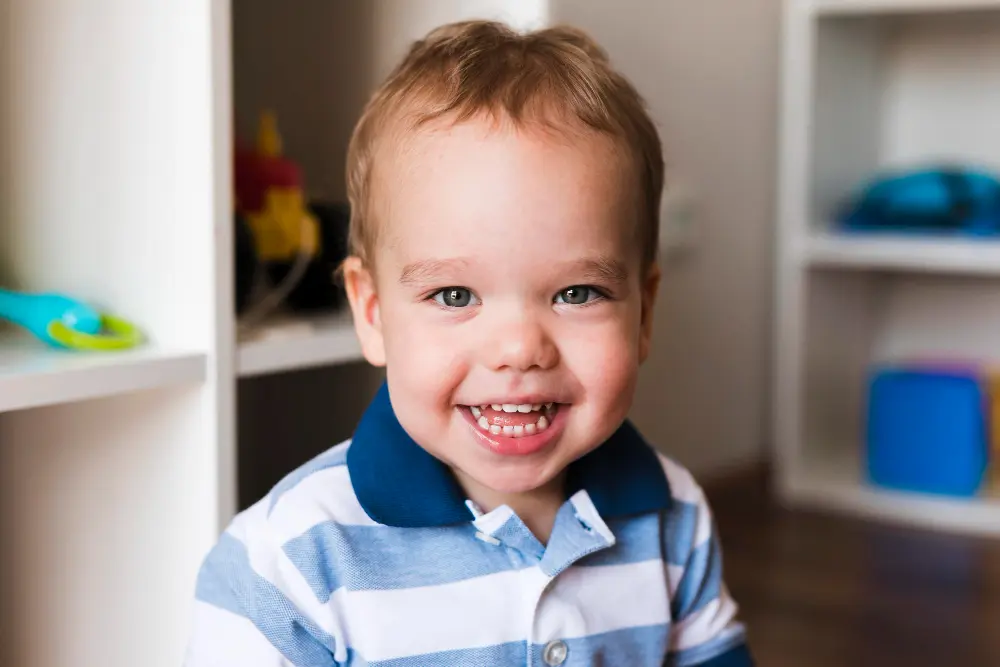Human dentition is a complex biological process that unfolds in various stages throughout life. This article will delve into the details of how many teeth we have at different stages of this development, from the first eruption of baby teeth to the complete formation of permanent ones.
Baby Teeth

In the initial stage of human dentition, there is a notable occurrence of baby teeth, also referred to as deciduous teeth. The process typically starts at around six months old and is typically finished by the age of two and a half. Throughout this stage, a child’s mouth undergoes the development of a total of twenty teeth, with ten located in the upper jaw and ten in the lower jaw.
The sequence of baby tooth eruption typically follows a consistent pattern, although there may be slight variations from person to person. Typically, the lower central incisors are the first teeth to emerge, followed by the upper central incisors. Afterward, the upper and lower lateral incisors, first molars, canines, and second molars come through.
It is important to note that baby teeth are smaller and less resistant than permanent teeth, yet they play a crucial role in the development of chewing, speech, and the correct growth of facial bones. Additionally, they play a role in shaping the smile and impacting the overall appearance of the face.
The Change of Teeth
At around six years old, a natural transition occurs where baby teeth are gradually replaced by permanent teeth, known as mixed dentition. This period of transition can span over several years, until the permanent dentition is fully developed around the age of twelve or thirteen.
The order of permanent tooth eruption follows a specific and predictable sequence. First, the permanent incisors make their appearance, followed by the first molars. Afterward, the canines, premolars, and eventually, the second and third molars, which are commonly referred to as wisdom teeth, emerge.
The permanent dentition comprises a total of thirty-two teeth, which are evenly distributed between the upper and lower arches. The arch consists of a set of four incisors, two canines, four premolars, and six molars. This dental arrangement enables effective chewing, clear speech, and a pleasing appearance.
Factors Influencing Dentition
So far, we have discussed how many teeth we have at different stages, now we will explain the factors that influence dentition. Various factors can affect the timing and manner of tooth eruption. Genetics plays a significant role, partly determining the sequence and speed of tooth eruption. The child’s overall health, nutrition, and the presence of any diseases can also affect the process.

In some cases, dental anomalies can occur. Hyperdontia, characterized by the presence of extra teeth, and hypodontia, characterized by the absence of one or more teeth, are examples of these conditions. Malocclusion, or misalignment of the teeth, can also affect the teething process and may require orthodontic intervention.
Dental Care at All Stages of Life
Dental care is essential at all stages of life, from baby to adulthood. Proper oral hygiene, including regular brushing, flossing, and using mouthwash, is essential to prevent cavities and gum disease.
Regular dental check-ups are equally important. The dentist can monitor the development of the dentition, identify any abnormalities, and provide advice on proper oral hygiene.
Dental care is a lifelong journey that requires consistent attention and care. By establishing good oral hygiene habits early in life and maintaining regular dental check-ups, individuals can enjoy a lifetime of healthy smiles. Remember, prevention is key to maintaining optimal oral health.
In conclusion, human dentition is a complex and fascinating process that unfolds in various stages of life. Taking care of your smile at all stages is essential to ensure optimal oral health and a healthy, lasting smile.
EXCELLENTBased on 119 reviews Posted on
Posted on
 Angelique Van Luchene2025-09-30Wij bezochten Dental clinic (Class Dent) per toeval. We werden opgehaald aan de luchthaven. We werden hartelijk omhaalt door Kevin. Super gast! We werden door Kevin meteen geïntroduceerd in de wereld van Albanië en wat er om leeft. Dit stelde ons meteen gerust.We werden eerst geconfronteerd met ons verblijf. Het appartement waar we verbleven was heel proper. Kort erna werden we verwacht in de kliniek, heel proper, de laatste nieuwe apparatuur en hier hartelijk onthaald geweest. We hebben hier ook de eerste richtlijn gehad wat er ons te wachten stond. De dag erna werden alle tanden getrokken die moesten verwijderd worden. Een hele goeie opvolging van Kevin die mij constant op de hoogte houd van wat er was gebeurd met mijn man. Elke dag stonden er een of meerdere consultaties op de agenda voor de opvolging. De hygiëne is er op en top ! Drie dagen na de operatie werden de voorlopig tanden geplaatst, zoals beloofd. Wij zijn de dag erna teruggevlogen naar België en we wachten nog 3-4 maanden af om terug te komen zodat de uiteindelijke implantaten kunnen geplaatst worden. Wij zijn alvast heel enthousiast over het gebeuren en de werking van de kliniek .Wij zien elkaar terug en februari of maart 2026 voor de definitieve tanden. Kevin, en de rest van de tandartsen…jullie zijn toppers ! Jullie toveren een lach op iemands gezicht die al heel lang niet meer kon lachen. Vele groeten Diederik en AngeliquePosted on
Angelique Van Luchene2025-09-30Wij bezochten Dental clinic (Class Dent) per toeval. We werden opgehaald aan de luchthaven. We werden hartelijk omhaalt door Kevin. Super gast! We werden door Kevin meteen geïntroduceerd in de wereld van Albanië en wat er om leeft. Dit stelde ons meteen gerust.We werden eerst geconfronteerd met ons verblijf. Het appartement waar we verbleven was heel proper. Kort erna werden we verwacht in de kliniek, heel proper, de laatste nieuwe apparatuur en hier hartelijk onthaald geweest. We hebben hier ook de eerste richtlijn gehad wat er ons te wachten stond. De dag erna werden alle tanden getrokken die moesten verwijderd worden. Een hele goeie opvolging van Kevin die mij constant op de hoogte houd van wat er was gebeurd met mijn man. Elke dag stonden er een of meerdere consultaties op de agenda voor de opvolging. De hygiëne is er op en top ! Drie dagen na de operatie werden de voorlopig tanden geplaatst, zoals beloofd. Wij zijn de dag erna teruggevlogen naar België en we wachten nog 3-4 maanden af om terug te komen zodat de uiteindelijke implantaten kunnen geplaatst worden. Wij zijn alvast heel enthousiast over het gebeuren en de werking van de kliniek .Wij zien elkaar terug en februari of maart 2026 voor de definitieve tanden. Kevin, en de rest van de tandartsen…jullie zijn toppers ! Jullie toveren een lach op iemands gezicht die al heel lang niet meer kon lachen. Vele groeten Diederik en AngeliquePosted on
 Nicola Buono2025-09-20Sono degli angeli professionali, gentili e abbastanza onestiPosted on
Nicola Buono2025-09-20Sono degli angeli professionali, gentili e abbastanza onestiPosted on
 Malgorzata Skala2025-08-29During my holiday, I ended up at this clinic completely by chance – I broke a tooth and needed urgent help. I was pleasantly surprised by how quickly and professionally I was treated. From the very beginning, the staff were extremely kind, friendly, and caring, and the doctor explained every step of the treatment in detail. Despite the stressful situation, I felt very well taken care of. The procedure was carried out efficiently and painlessly, and the result exceeded my expectations. The atmosphere in the clinic is welcoming and modern, and it is clear that the people working there are passionate and highly experienced. I am grateful that I came across this place – they saved my holiday and restored the comfort of my smile. I can wholeheartedly recommend it to anyone looking for professionalism combined with a truly human approach.Posted on
Malgorzata Skala2025-08-29During my holiday, I ended up at this clinic completely by chance – I broke a tooth and needed urgent help. I was pleasantly surprised by how quickly and professionally I was treated. From the very beginning, the staff were extremely kind, friendly, and caring, and the doctor explained every step of the treatment in detail. Despite the stressful situation, I felt very well taken care of. The procedure was carried out efficiently and painlessly, and the result exceeded my expectations. The atmosphere in the clinic is welcoming and modern, and it is clear that the people working there are passionate and highly experienced. I am grateful that I came across this place – they saved my holiday and restored the comfort of my smile. I can wholeheartedly recommend it to anyone looking for professionalism combined with a truly human approach.Posted on
 Ardjana Himalli2025-08-25Mi sono trovata davvero molto bene presso questo studio dentistico. Ho apprezzato fin da subito la grande professionalità di tutto lo staff, unita a una gentilezza che mette subito a proprio agio. L’ambiente è accogliente, curato e soprattutto estremamente pulito, cosa che trasmette un senso di sicurezza e attenzione ai dettagli. Durante le visite mi sono sempre sentita ascoltata e seguita con competenza. Consiglio vivamente a chi cerca un dentista serio, preparato e umano.Posted on
Ardjana Himalli2025-08-25Mi sono trovata davvero molto bene presso questo studio dentistico. Ho apprezzato fin da subito la grande professionalità di tutto lo staff, unita a una gentilezza che mette subito a proprio agio. L’ambiente è accogliente, curato e soprattutto estremamente pulito, cosa che trasmette un senso di sicurezza e attenzione ai dettagli. Durante le visite mi sono sempre sentita ascoltata e seguita con competenza. Consiglio vivamente a chi cerca un dentista serio, preparato e umano.Posted on
 kyle orten2025-08-09Excellent care and customer service.Posted on
kyle orten2025-08-09Excellent care and customer service.Posted on
 Ferdows Rasooli2025-07-25I did implant in hier with my wife and the surgery was gone very good, Was the best experience at this clinic, respectful stuff and respectful Doctor, thank youPosted on
Ferdows Rasooli2025-07-25I did implant in hier with my wife and the surgery was gone very good, Was the best experience at this clinic, respectful stuff and respectful Doctor, thank youPosted on
 Oliver Memo2025-07-17La migliore esperienza dentale che io abbia mai avuto. Sono stati molto gentili, specialmente il dottor Marius, il mio dentista preferito.Posted on
Oliver Memo2025-07-17La migliore esperienza dentale che io abbia mai avuto. Sono stati molto gentili, specialmente il dottor Marius, il mio dentista preferito.Posted on
 David Jonsson2025-07-09Exceptional Dental Experience in Durrës, Albania From the very beginning, the service at ClassDent Clinic (Lagja 1, Rruga Taluantia, 2001, Durrës, Albania) was world-class. The clinic’s team handled everything with professionalism, care, and great efficiency, making the entire experience smooth and stress-free. What truly stood out were four key things: 1. Outstanding service from the first contact to the final appointment. 2. Excellent communication—clear, responsive, and reassuring throughout. 3. A highly skilled and kind dental team, who made me feel comfortable and well taken care of. 4. Very reasonable prices, especially considering the top-tier quality of care provided. If you’re considering dental work abroad, I can wholeheartedly recommend ClassDent Clinic in Durrës. Their commitment to patient care, modern equipment, and professional approach truly set them apart. A first-class experience from start to finish.Posted on
David Jonsson2025-07-09Exceptional Dental Experience in Durrës, Albania From the very beginning, the service at ClassDent Clinic (Lagja 1, Rruga Taluantia, 2001, Durrës, Albania) was world-class. The clinic’s team handled everything with professionalism, care, and great efficiency, making the entire experience smooth and stress-free. What truly stood out were four key things: 1. Outstanding service from the first contact to the final appointment. 2. Excellent communication—clear, responsive, and reassuring throughout. 3. A highly skilled and kind dental team, who made me feel comfortable and well taken care of. 4. Very reasonable prices, especially considering the top-tier quality of care provided. If you’re considering dental work abroad, I can wholeheartedly recommend ClassDent Clinic in Durrës. Their commitment to patient care, modern equipment, and professional approach truly set them apart. A first-class experience from start to finish.Posted on
 j——- D-man2025-07-02In februari en juni geweest en niets anders dan lof voor hun kunde en professionele aanpak. Je gaat pas naar huis als alles perfect is. Nog maals dank voor mijn perfecte glimlach en 5 sterren is veel te weinig. Dus voor jullie ⭐️⭐️⭐️⭐️⭐️⭐️⭐️⭐️⭐️⭐️
j——- D-man2025-07-02In februari en juni geweest en niets anders dan lof voor hun kunde en professionele aanpak. Je gaat pas naar huis als alles perfect is. Nog maals dank voor mijn perfecte glimlach en 5 sterren is veel te weinig. Dus voor jullie ⭐️⭐️⭐️⭐️⭐️⭐️⭐️⭐️⭐️⭐️







